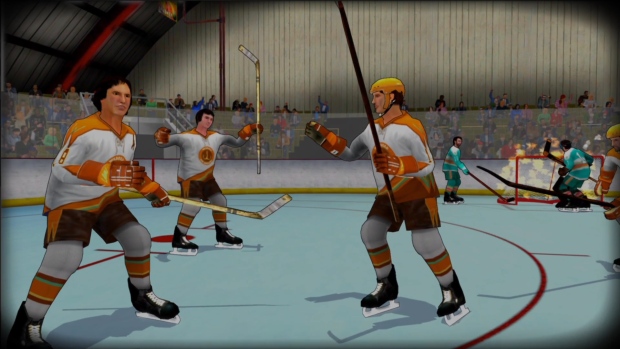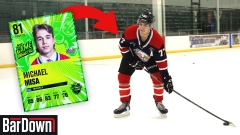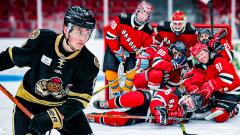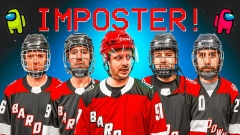Who else to faithfully recreate a 1970's style classic arcade hockey game but a developer from Canada?
Last week, the hotly anticipated retro-hockey game, Old Time Hockey, officially released on PS4 and on PC. If you haven't checked out our review of the game yet, you can read it here! Let's just say we've been working on our hip-check game all week long. Before the release of OTH, we spoke with Karthik Venkateshan, the President and CEO of V7 Entertainment, the developer behind the game. In our one-on-one talk with Karthik, we discussed how they went about researching 70's era hockey, why they decided to release this game now and what some of the challenges are behind being a startup developer in Canada.
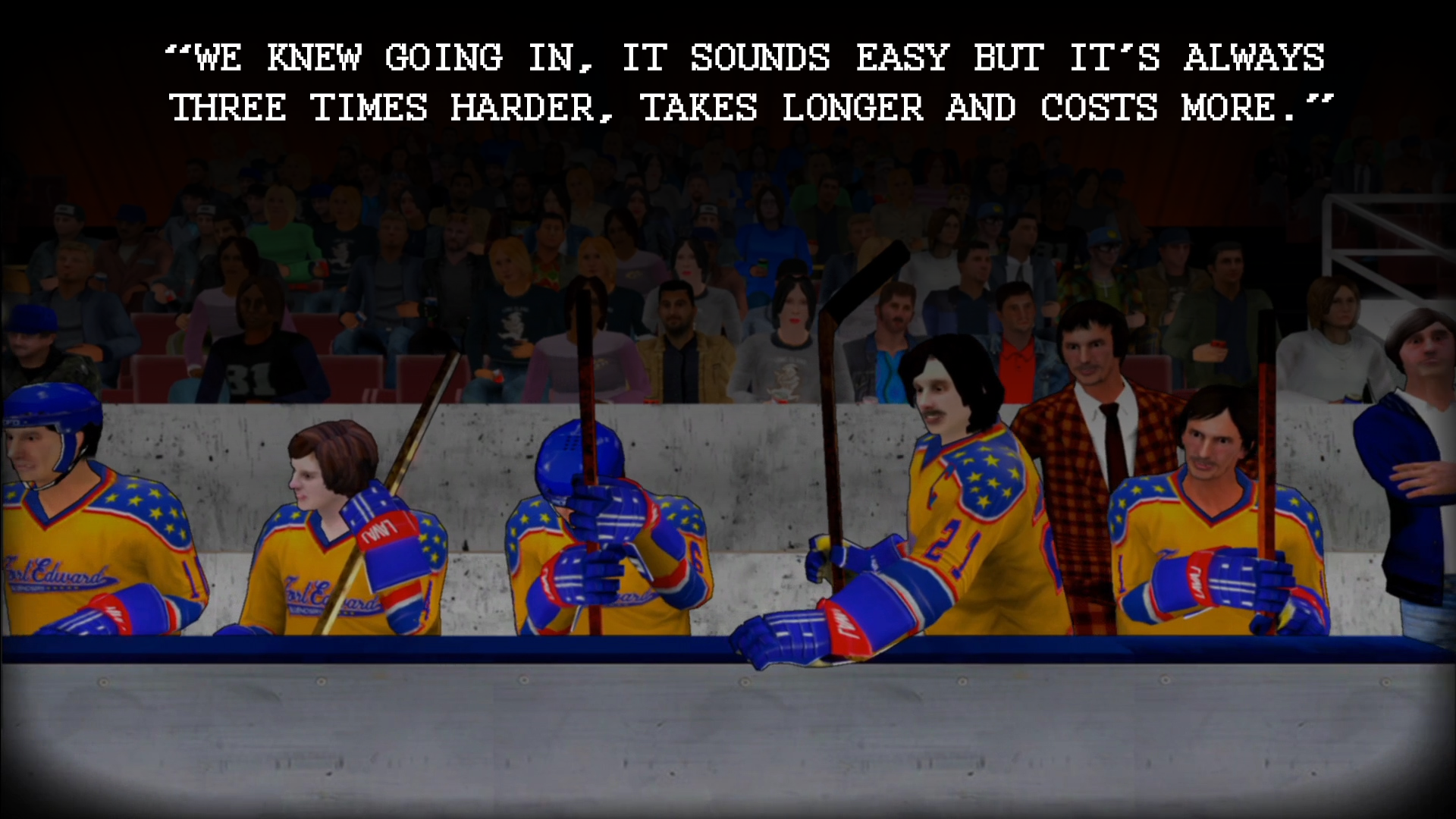
Daniel Zakrzewski: What type of research did you and your team conduct before going in and designing the actual aesthetic and atmosphere of the game?
Karthik Venkateshan: Well, quite a bit actually. Let’s start with the basics in terms of the beginning when we wanted to make a hockey game it was primarily centered around filling this void around fighting and aggressive over the top violence in hockey. It just naturally made sense for us more when we were figuring out the deigns for how comfortable and nice the hitting needs to be and how that naturally leads into fights, brawls, and what not.
It just made more sense for us to kind of put it in that 70s era where violence that we all remembered as being the peak with the Broad Street Bullies and everything. We are all big Slap Shot fans here too and we know that Slap Shot is a byproduct of that era having such amazing and over the top violence that we just don’t see anymore within the context of a sport. It’s very unique. And that led us to sort of really figure out how do we bring that experience to hockey fans.
We’ve done a ton of research watching. In fact, our producer will even tell you, we’ve watched more 70s hockey in the last 2-3 years then even just the current NHL games (laughs). Having the app, which allows you to do that where we watch a ton of classic games including Red Army games against the Canadiens, the Flyers, the infamous one where they had to get them off the ice for a bit in protest, the Blues. We’ve learned a ton too. A lot of it was a bit of a trip down memory lane for us as well. Things like how the Blues were the original tough team and they got Ed Snider and his teams really thinking in the direction of Broad Street Bullies and that’s what led to the bullies era and everything.
We’ve watched enough and there isn’t a whole lot written about it like in the sense that there are few books here and there. We have gleamed through the Internet and some books here and there and tried to really pay homage and tribute to all the craziness around what managers did back then or how the mangers were also coaches or sometimes even owned the teams in minor leagues.
So we really tried to bring that element in the sense that lets not do professional professional hockey, lets try to capture where hockey players more or less have real jobs outside of playing hockey.
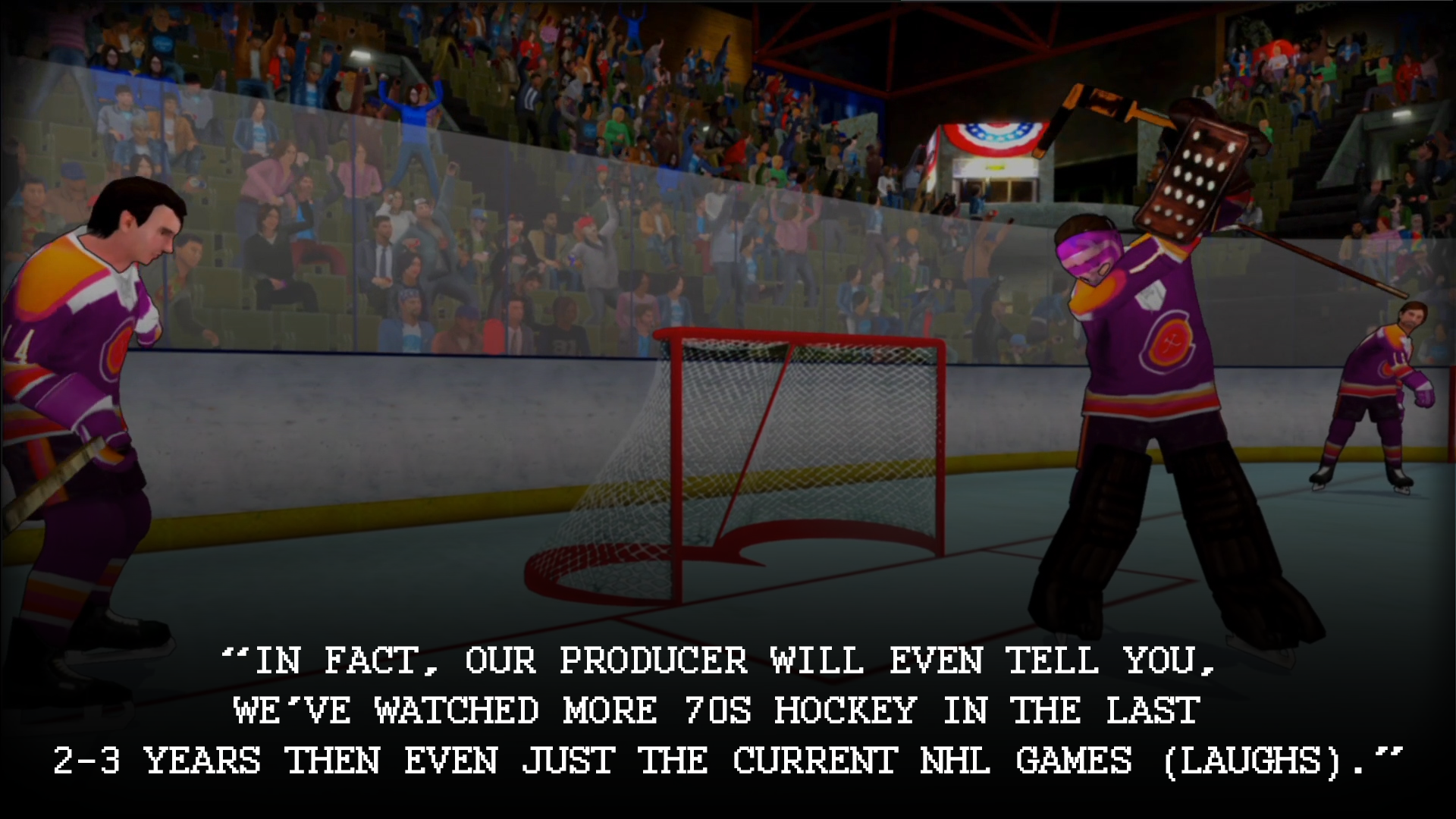
DZ: Looking out at the hockey gaming landscape, what was it exactly that kind of inspired your team to go out and make this specific type of game?
KV: For us it was twofold; we are all big sports fans and we wanted to pick something, we are a startup and everything, we wanted to pick something where we knew the journey would be tough given that we are sort of a very young team, inexperienced in terms of like having done this from start to finish. We’ve all had some experience working in the industry and making games. It doesn’t really compare to doing something from start to finish with a brand new title, which has no iteration or it’s not a franchise. So this was a tough one. We knew going in, it sounds easy but it’s always three times harder, takes longer and costs more. So we wanted to do something that we wanted to really stick through it. Only something that you’re so passionate about can you actually go through an ordeal.
We’ve been working on this project since early 2011 or late 2010; it started out as a passion. We are such big hockey nuts, that I don’t think there is anything in the world that we would stick through for so long and try to still come with smiles on our faces and quote lines from like Slap Shot or some random 70s manager and what crazy thing he did back then to get his team going like on the right track. So that was really the great inspiration for us to stick to this so that we can really do this well cause we love it so much. The other aspect of it was because we played, you know 2K at the time kind of dropped out, in I think it was 2009. We had seen NHL 3 on 3 Arcade do fairly well and then we knew EA wasn’t going to do anything in that space anymore. It felt right to do it in a sense, lets center our game around a bit more of the arcade element, a bit more retro and a bit more of the whole fundamental idea for us was, we need to make hockey in a way how it was played in a sense that you have to play a physical intimidation playoff style of hockey to really, less of the skill and the dangles, which we have in our game. But this is more trying to really get players to feel fatigued, to feel injured to really see fighting carry over into gameplay and that having a real effect.
DZ: NHL ‘94 is also an obvious inspiration to the game. Was there anything specific from that game that you wanted to bring over into what you have, since you know it is something that people hold so dearly in the hockey community?
KV: If I were to pick one thing...you know when you ask people who have played ’94 they always remember that one goal and everybody remembers the exact same goal and it's just that one thing that seems to always happen? Like those cheesy wraparounds, and it goes in 100% of the time no matter what you do and you know its coming, there’s nothing you can do about it, you just have to make your peace with it. So that was something we wanted to bring into old time hockey and it naturally happened in our case with the whole 70s goalie and what not with the stand up style there’s just so many holes and there’s more than one in old time hockey where you have that where everybody we hope, once they buy the game, remember that old time hockey moment then they know exactly what it is and can’t miss.
There’s no two ways about scoring that goal, there’s no two ways about triggering a fight with a goalie. That’s really the design principle we’ve gone with, it's that it’s all in countable discrete measure. In a sense that 3 hits gets you on fire, 3 goals well on fire on the goalie will get the goalie to drop the gloves. You can instigate him and score on him if you are playing with a buddy. We’ve got some tag team moves like that. We’ve got some Slap Shot references, with being able to hip check your own teammate if you miss the rhythm cause it’s so powerful.
Last thing id like to say, if NHL ’94 is known for it’s incredibly powerful one-timers, ours will be known for it’s incredibly powerful hip-checks. It connects very well in our game.
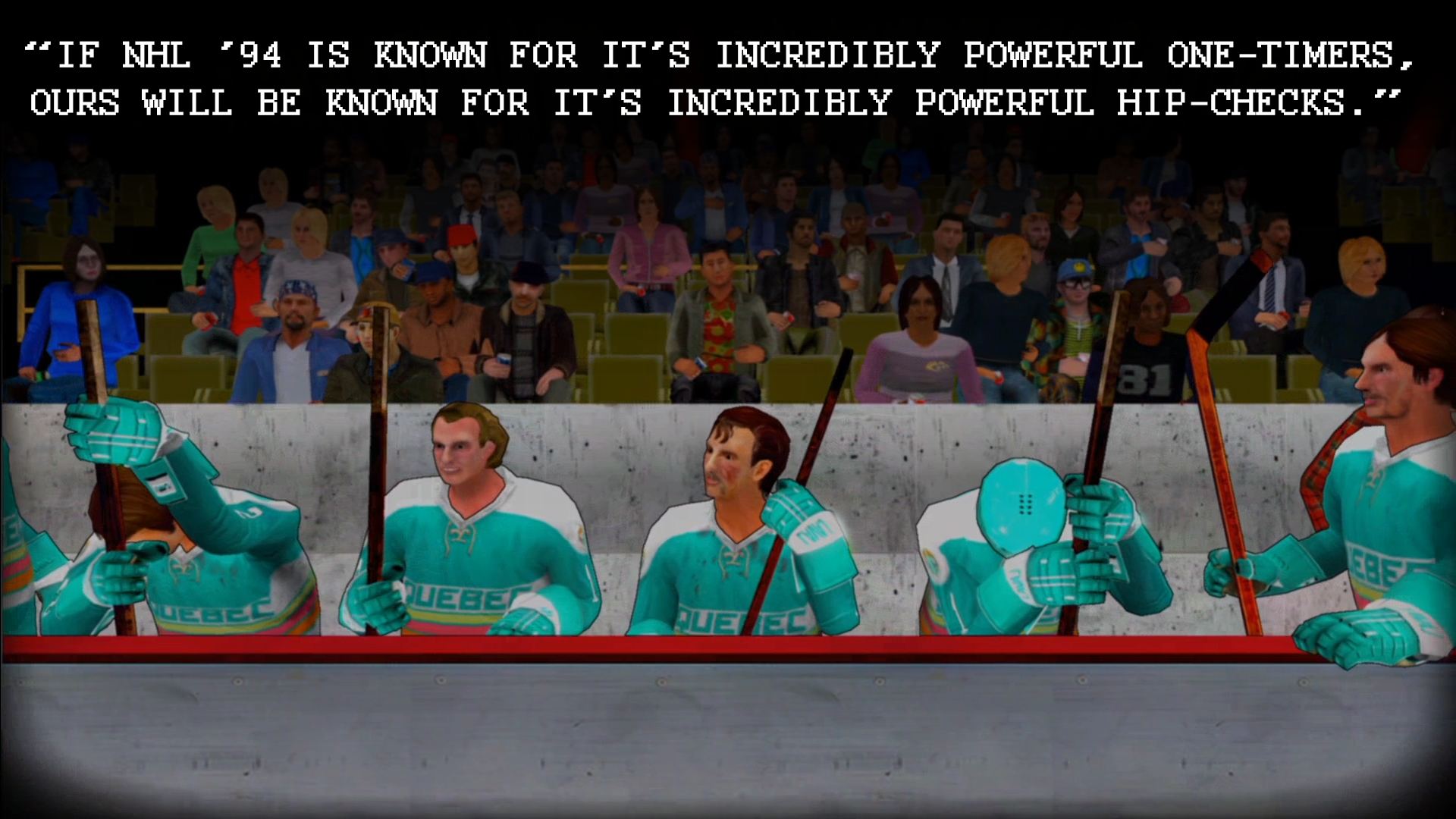
DZ: With the game primarily being focused on nostalgia, the decision to incorporate the analog, kind of more modern style of controls into the story mode at least on the medium to hard difficulty settings, what kind of went into that decision instead of just sticking to two or three buttons?
KV: Good question. When we were building up the story mode and season, one of the principle purposes of the narrative driven mode was giving a reason for every game. When you are playing it like I need to know why I’m playing this game. Or there’s some context behind. Okay, this is what I need to do or this is where I am in the standings and this is what my manager chalked up some crazy story and therefore I’m playing this game and it has that reason.
The other one is that you have 30 something games and then you got some playoffs. With just the two-button mode, it doesn’t feel like there was enough depth that carried you through those games. We didn’t feel like users would necessarily get better in ways. Our game, one thing that is cool about it, and maybe some of the more of the casual fans may not necessarily like it. There is tremendous depth in the amount of moves you can do compared to any retro arcade game that you’ve seen. And that is the natural sort of bleed through from us and our developers are very big fans. We’ve never missed an NHL iteration no matter if it’s better or bad, one year or the other. We all passionately play it when we are at our buddies house. We’ve always said, its going to have an arcade presentation, but let’s not reduce the depth so much that it doesn’t have a deeper meaning than a handful of games where you’re going to get bored. So with us, in Old Time Hockey, you can really play this game, after you played through the story mode, and learn through the controls, you can play this as well as if not like how the sim game plays, but you have enough moves in there, you can get creative with this, you can score better goals, you can set things up, you can play defensively. Arguably it’s a bit tough, because it’s a first generation game, but you can do it if you’re good with hockey games and you've played other ones through the years. I think people will really enjoy the depth in this game.
DZ: Speaking of controls schemes, the beer mode, how did that go about? Whose idea was that? It’s pretty clever.
KV: Funny enough it was one of those things...you know how they say good things just happen with the least amount of thinking? We were playing the game and yes we had a few beers and we kept noticing that we all would all wait for the opening sequence. Just so that we could take a sip of our beer because that’s the natural motion, don’t skip it; I’m going to have a sip over here. That kind of got us thinking, wouldn’t it be cool if we could just keep holding this drink and just keep playing at the same time and that’s how the beer mode was born.
DZ: At the moment there’s no online play yet to the game, is there any hope of adding that perhaps in the near future or later down the line?
KV: If we are going to do online, it’s definitely going to be in version two. I don’t know if we can necessarily do a patch on this existing one. But then again, with the right amount of support it is possible. But the engine is an open source engine; it’s called Mono Game. So we need some help from those guys as well, it depends on their schedule and if they’re actually going to support it and all that. But who knows we actually may be able to work with them on it if there’s a lot of support on this game.
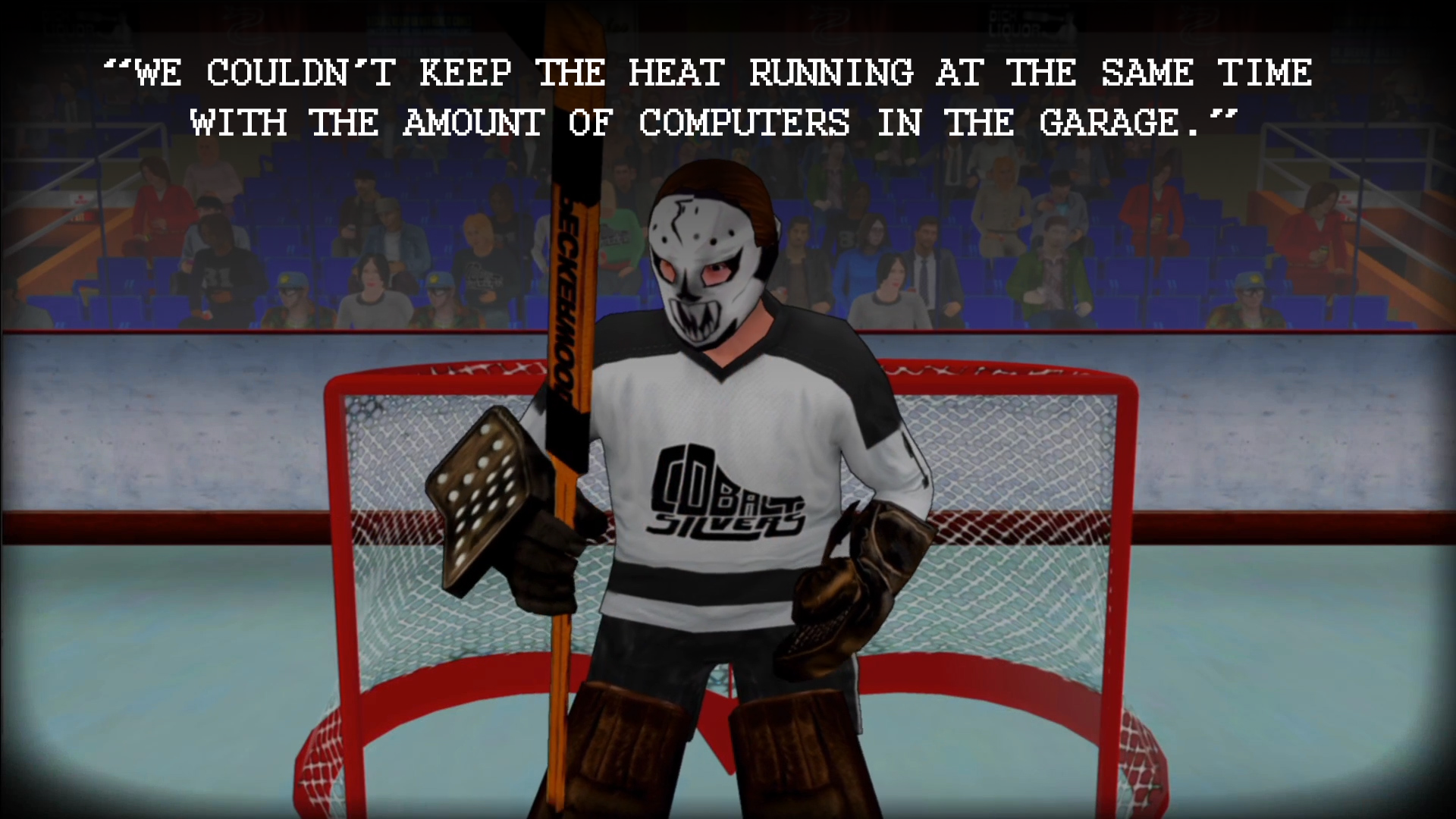
DZ: Last question. You guys are a Canadian startup company. For fans out there, could you tell us a little about your studio and the aspect of being a startup company in Canada and making a hockey game?
KV: We are based out of Vancouver in British Columbia. We’ve started up as a classic garage startup and it was in one of the coldest winters in 2010 and it was brutal. We couldn’t keep the heat running at the same time with the amount of computers in the garage. Ouuuu that was tough! We were lucky enough to win some space with an incubation facility here in Vancouver, called generator space. And then since then we’ve moved on we are still with SFU (Simon Fraser University) winter labs which is a university partnered sort of incubation facility. We share the space with 10 or 12 other startup companies. We’ve had a lot of support from the provincial side and federal side in terms of the amazing programs that help startups grow and to reduce the burden tax wise and what not. It’s been a lot of fun.
I’ve worked at EA and a couple other spots as well. The feel that what you get with a startup is that you really build those close, tight knit relationships with your employees. They almost become family. You spend so much time with them, you build these amazing relationships that are tough to form, if let’s say you’re working at a bigger company where people come and go. There’s just a lot more with a startup in terms of the character and personality and everything matters a lot more, because it’s such a small team. We watch hockey games together, we would host parties at each other’s house. You form these intangible relationships much like how a sports team would work or what not. Which you don’t get outside of a startup.
We’ve been lucky to surround ourselves with some veteran guys as well in the industry to help navigate the ropes of decision-making, what’s under-scoped, what’s over-scoped. How to keep in the mind of fans, of a broad spectrum of accessibility levels and what not. It’s been a tough but a very fun journey.
Old Time Hockey is available now in the Playstation Store (PS4) & on Steam (PC)
